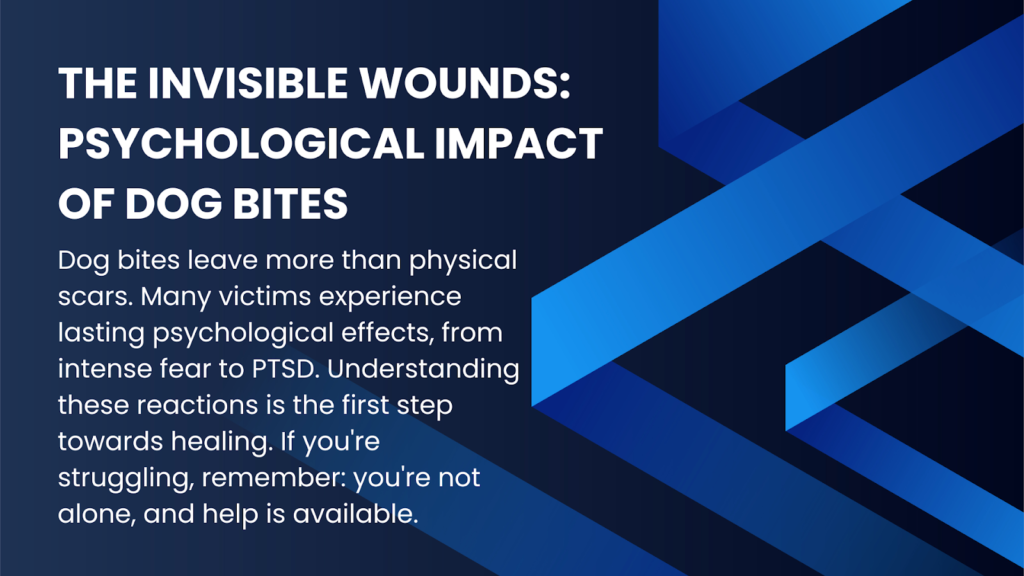
While the physical scars may heal, the emotional impact of a dog bite can linger long after the incident.
This guide delves into the often-overlooked psychological consequences of dog bite injuries, offering insight and support for those grappling with trauma and emotional distress in Alabama.
Understanding the Psychological Impact of Dog Bites
The moment a dog’s teeth break the skin, it’s not just a physical wound that’s inflicted. For many victims, a dog bite marks the beginning of a complex psychological journey. The American Psychological Association reports that up to 5% of dog bite victims experience symptoms consistent with post-traumatic stress disorder (PTSD).
Common Psychological Reactions
- Fear and Anxiety: Many victims develop an intense fear of dogs or outdoor spaces where dogs might be present.
- Post-Traumatic Stress Disorder (PTSD): Flashbacks, nightmares, and hypervigilance are common symptoms.
- Depression: The trauma can lead to feelings of helplessness and sadness.
- Social Isolation: Fear of encountering dogs may cause victims to avoid social situations.
- Low Self-Esteem: Visible scars or disfigurement can impact body image and confidence.
Factors Influencing Psychological Impact
- Severity of the Physical Injury: More severe injuries often correlate with increased psychological distress.
- Age of the Victim: Children may be particularly vulnerable to long-term psychological effects.
- Previous Experiences: Prior trauma or mental health conditions can exacerbate the impact.
- Support System: Strong social support can mitigate psychological consequences.
Understanding these psychological impacts and influencing factors is crucial for developing effective treatment strategies and providing comprehensive support to dog bite victims on their path to recovery.

Recognizing the Signs of Emotional Distress
Identifying the signs of emotional distress following a dog bite is crucial for timely intervention and support. Here are some indicators to watch for:
- Persistent Fear: Excessive fear of dogs or places where dogs might be present.
- Sleep Disturbances: Nightmares or difficulty falling asleep due to anxiety.
- Mood Changes: Irritability, sadness, or unexpected emotional outbursts.
- Avoidance Behaviors: Refusing to go outside or participate in activities that may involve encountering dogs.
- Physical Symptoms: Headaches, stomachaches, or other unexplained physical complaints.
If you or a loved one are experiencing these symptoms following a dog bite, it’s important to seek professional help. Mental health professionals can provide valuable support and coping strategies.
The Road to Recovery: Coping Strategies and Treatment Options
Healing from the psychological trauma of a dog bite is a journey, but with the right support and strategies, recovery is possible. Here are some approaches that can help:
Therapeutic Interventions
- Cognitive Behavioral Therapy (CBT): This evidence-based therapy helps individuals identify and change negative thought patterns and behaviors associated with the trauma.
- Eye Movement Desensitization and Reprocessing (EMDR): A specialized therapy that can be particularly effective for processing traumatic memories.
- Exposure Therapy: Gradually and safely reintroduce the individual to dogs or situations that trigger anxiety.
- Group Therapy: Sharing experiences with others who have gone through similar traumas can provide validation and support.
Self-Help Strategies
- Mindfulness and Relaxation Techniques: Practices like deep breathing, meditation, and progressive muscle relaxation can help manage anxiety.
- Physical Exercise: Regular exercise can boost mood and reduce stress levels.
- Journaling: Writing about the experience and emotions can be a therapeutic outlet.
- Education: Learning about dog behavior and safety can help rebuild confidence around dogs.
Remember, healing is a personal process, and what works for one person may not work for another. It’s important to work with mental health professionals to develop a tailored treatment plan.
The Impact on Daily Life: Challenges and Adaptations
The psychological effects of a dog bite can ripple through various aspects of daily life, presenting unique challenges that require adaptation and support.
Work and School Performance
Concentration difficulties and anxiety can impact productivity at work or academic performance. Some individuals may require accommodations or temporary leave to focus on recovery.
Social Relationships
Fear of dogs can strain relationships, especially with dog-owning friends or family members. Open communication about boundaries and needs is crucial during this time.
Physical Health
The stress and anxiety following a dog bite can manifest in physical symptoms, potentially exacerbating the initial injury or causing new health concerns.
Financial Strain
The combination of medical bills, therapy costs, and potential loss of income can create financial stress, adding another layer to the emotional burden.
Adapting to these challenges often requires a multi-faceted approach, involving support from mental health professionals, employers, educators, and loved ones.
Legal Considerations: Understanding Your Rights in Alabama
In Alabama, understanding your legal rights following a dog bite is crucial for protecting your interests and securing necessary compensation for both physical and psychological injuries.
Alabama’s Dog Bite Law
Alabama follows a “one bite rule” with some exceptions. Under this rule, a dog owner may be held liable if:
- The dog has previously bitten someone or shown aggressive tendencies.
- The owner was aware of the dog’s dangerous propensities.
- The victim was lawfully on the property where the bite occurred.
However, if the bite occurred on the dog owner’s property and the victim was trespassing, the owner may not be held liable.
Statute of Limitations
In Alabama, the statute of limitations for filing a dog bite lawsuit is generally two years from the date of the incident. It’s crucial to act promptly to preserve your legal rights.
Recoverable Damages
Victims of dog bites in Alabama may be able to recover damages for:
Medical expenses (including psychological treatment);
- Lost wages;
- Pain and suffering;
- Emotional distress; and
- Property damage.
Documenting all aspects of your physical and psychological recovery is essential for building a strong case.
Resources and Support in Alabama
Alabama offers various resources for individuals coping with the aftermath of a dog bite:
- Alabama Department of Public Health: Provides information on dog bite prevention and reporting.
- Alabama Psychological Association: Offers a directory of licensed psychologists specializing in trauma.
- Local Support Groups: Many communities have support groups for trauma survivors.
- Alabama Bar Association: Can provide referrals to attorneys specializing in dog bite cases.
Remember, seeking help is a sign of strength, not weakness. Don’t hesitate to reach out to these resources for support on your journey to recovery.
Frequently Asked Questions
Navigating the aftermath of a dog bite can raise many questions about psychological recovery and legal rights. Here are answers to some of the most common inquiries we receive.
How Long Does It Take to Recover from the Psychological Trauma of a Dog Bite?
Recovery time varies greatly depending on the individual and the severity of the trauma. Some people may start to feel better within a few weeks or months, while others may struggle for years. Professional help can significantly speed up the recovery process.
Can Children Recover from Dog Bite Trauma More Easily Than Adults?
While children can be resilient, they may also be more vulnerable to long-term effects. Early intervention and support are crucial for children to process the trauma and develop healthy coping mechanisms.
Is It Normal to Feel Angry or Guilty After Being Bitten by a Dog?
Yes, a wide range of emotions, including anger and guilt, are common reactions to trauma. These feelings are part of the healing process and can be addressed through therapy.
Can I Still Own a Dog if I’ve Developed a Fear After Being Bitten?
Many people who have been bitten are able to overcome their fear and safely own dogs in the future. Gradual exposure therapy under professional guidance can be very effective in rebuilding comfort around dogs.
Will Insurance Cover Therapy for Dog Bite-Related Trauma?
Many health insurance plans cover mental health treatment, including therapy for trauma. Check with your insurance provider for specific coverage details.
The Path Forward
The journey to recovery from the psychological trauma of a dog bite is deeply personal and often challenging. However, with proper support, professional help, and time, healing is possible.
If you or a loved one are struggling with the emotional aftermath of a dog bite in Alabama, know that you don’t have to face this challenge alone.
Professional support is available to guide you through the healing process and help you navigate any legal considerations.
Take the first step towards healing and justice. Contact Baxley Maniscalco today for a free, confidential consultation. Let us help you understand your rights and explore your options for recovery.
Can't find what you're looking for? Search our site below.










